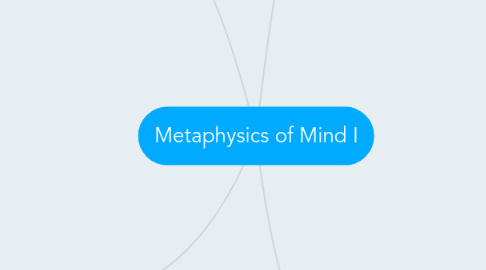
1. Cartesian substance dualism
1.1. 3 claims needed for dualism 1.Mind exist independently of bodies 2.That minds exist 3.That bodies exist
1.2. Types of substance is defined by essential properties. res extensa - body is extended in space res cogitans - the mind thinks
1.3. Leibniz's Law - the indiscernibility of identicals. If X and Y are the same thing, then they have the same properties.
1.4. Biggest challenge: Mental causation: Psychological states cause changes to body. How if the mind is not physical can it cause physical changes
1.4.1. Physical changes require cause to have a spatial location/some form of physical energy - the mind has neither
1.4.2. Physical changes caused by a non-physical substance would violate the law of the conservation of energy
1.4.3. How brain process could cause changes in the mind is mysterious
2. Property dualism
2.1. There is no distinct mental substance. But some of the properties of the brain/person are not physical but distinct mental properties. E.g. consciousness
2.2. Properties are emergent - new kind of property irreducible to any other form of property
2.3. Probably natural laws connecting them with other properties - but there is no necessity linking them to the physical
2.4. Epiphenomenalism: Property dualism plus mental properties have no causal powers
2.4.1. Property dualism says that scientific structure is not true and that Psychology should be at the beginning. Wittgenstein (behaviouralist) thinks we should look to the language "All that is not grammar is gas"
3. Having a mind
3.1. Having a mind is having a point of view on the world, perspectives, opinions/beliefs. 2 features of mind:
3.2. Content: About something - states of mind are about something. "I want X" "I desire X" But how can physical mental states have content?
3.3. Consciousness: Perspective on the world How can physical sciences explain subjective experience like consciousness
4. Metaphysics of Mind views
4.1. Substance - Entity that does not depend on another entity to exist, persistent through change, possessor of properties
4.1.1. Forms of Monism: 1 kind of substance
4.1.2. Idealism: Mind is a substance and can exist without bodies. Body depends on minds.
4.1.3. Meterialism: Mind is a substance. Minds cannot exist without bodies. Minds depends on bodies.
4.2. Minds are not a substance but a distinct kind of property
4.2.1. YES: Property dualism: Consciousness is irreducible
4.2.2. NO: 4 forms of Materialism 1.Behaviourism - talk of mental properties is talk of behaviour 2.Functionalism - Mental properties are functional 3.Reductive physicalism/Type identity - Mental properties are physical properties 4.Eliminativism - No mental properties
4.3. Physicalism: Everything that exists depends on something physical. Essential properties of matter are described by physics
4.4. Alternative view: Something wrong with underlying metaphysics
4.4.1. Anomolous monism: No properties, just description of the world
4.4.2. Persons are substances (Aristotle, Strawson, Hacker, Lowe)
4.4.3. Neutral Monism: Mind and body are 2 distinct appearances of some underlying substance which is neither (Spinoza, Russel)
